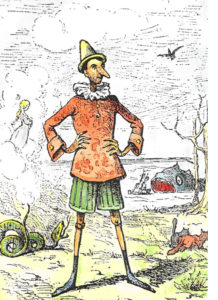
One of the very first moral commandments we learn as children is: “Never tell a lie.” From early on, stories of lies and liars fill our imaginations. What child hasn’t felt Eve’s shame for believing that sneaky serpent’s lies, a transgression God punished by expelling Adam and Eve from Paradise, the Biblical explanation for all human suffering?
 What about Pinocchio whose foolish fibs cause his nose to grow so monstrously large that he can no longer fit through his front door?
What about Pinocchio whose foolish fibs cause his nose to grow so monstrously large that he can no longer fit through his front door?
Or Aesop’s fable about “The Boy Who Cried Wolf” who spread false alarms about a wolf attack so many times that when a wolf actually appears, the shepherds ignore his warning, to devastating results.
Most of us lie and most of us know when we’re lying (or fibbing, a less cringe-inducing word) unless we are compulsive liars, a more serious psychological condition related to character disorders. But how many of us have examined why we lie?
A friend recently sent me an essay, “Let’s Be Honest,” by the American philosopher Sally Kempton in which she explores various facets of why we lie, the types of lies, and the crucial role our intention to deceive plays in how we judge the morality of a falsehood. History is full of tragedies caused by the powerful when they use lies to justify the ends they seek (see Machiavelli’s The Prince). Our current embroilment with fake news suggests we have some confusion about lies and the nature of truth. Lying is not simply the stating of a falsehood or the twisting of truth. A desire to deceive can warp and corrupt even a truthful statement.
 “If you tell a big enough lie and tell it frequently enough, it will be believed” is a quote frequently attributed to Adolf Hitler or to his minister of propaganda Joseph Goebbels. The quote actually originated in an Office of Strategic Services report on “Hitler’s rules,” which characterized one of them as “People will believe a big lie sooner than a little one; and if you repeat it frequently enough people will sooner or later believe it.” This quote recalls Napoléon Bonaparte’s observation that “History is a set of lies that people have agreed upon.”
“If you tell a big enough lie and tell it frequently enough, it will be believed” is a quote frequently attributed to Adolf Hitler or to his minister of propaganda Joseph Goebbels. The quote actually originated in an Office of Strategic Services report on “Hitler’s rules,” which characterized one of them as “People will believe a big lie sooner than a little one; and if you repeat it frequently enough people will sooner or later believe it.” This quote recalls Napoléon Bonaparte’s observation that “History is a set of lies that people have agreed upon.”
But day to day, it’s smaller lies that concern us. Sally Kempton offers us a scale:
“If we use a 1 to 10 scale, with polite lies (‘No, that dress doesn’t make you look fat’) at the low end, and outrageous, destructive lies at the high end, your worst falsehoods would probably rate no more than a three of four. Yet those falsehoods are probably lodged in your psyche, still giving off smoke, perhaps even to obscure the clarity of your heart. You can justify them, but some part of you feels the effect of every lie you’ve ever told.”
The harm of lying, we’ve been taught, is the harm our dishonesty perpetrates on others, but Kempton’s first point is that lying is harmful to the self. It corrodes our integrity, damages our trust, makes us suspicious that others, like ourselves, are deceptive. Lying severs our connection with reality, or seriously damages it. Concealing the facts and keeping secrets costs us emotional and mental energy and fogs our ability to recognize the truth.
It is exactly what the writer Virginia Woolf means when she writes: “If you do not tell the truth about yourself you cannot tell it about other people.”
 Kempton goes on to share an experiment. Inspired by Gandhi’s autobiography, My Experiments with Truth, she attempted to practice absolute truthfulness for a week. She lasted two days. She explains: “The problem was that practicing factual truthfulness made me even more aware of the web of unspoken falsehoods that I lived with. Falsehoods like the pretense of liking a person I actually found irritating. Or the mask of detachment with which I covered my intense desire to be chosen for a certain job.” Her conclusion—honesty is more complicated than it appears.
Kempton goes on to share an experiment. Inspired by Gandhi’s autobiography, My Experiments with Truth, she attempted to practice absolute truthfulness for a week. She lasted two days. She explains: “The problem was that practicing factual truthfulness made me even more aware of the web of unspoken falsehoods that I lived with. Falsehoods like the pretense of liking a person I actually found irritating. Or the mask of detachment with which I covered my intense desire to be chosen for a certain job.” Her conclusion—honesty is more complicated than it appears.
Through self-inquiry and investigation, Kempton outlines three categories of truthfulness. Absolute truthfulness, meaning one shouldn’t lie, ever. At the opposite end is the utilitarian position: “Always tell the truth except when a lie is to your advantage.” We can find examples of this in the words of governments, corporations, and religious institutions. The acclaimed Soviet poet Yevgeny Yevtushenko, whose anti-Stalinist poems and writings inspired a generation of Russian writers, clearly had this in mind when he wrote, “When truth is replaced by silence, the silence is a lie.”
 Kempton’s third category seeks to balance the first two: “It recognizes the high value of truth, but points out that truth-telling can sometimes have harmful consequences and needs to be balanced by other ethical values like nonviolence, peace, and justice.” When a German family lies to the Nazis that they are hiding Jews, or when a daughter decides not to tell her fragile, elderly parent that he has a terminal disease, these lies, though misleading, are motived by high ethical and moral goals.
Kempton’s third category seeks to balance the first two: “It recognizes the high value of truth, but points out that truth-telling can sometimes have harmful consequences and needs to be balanced by other ethical values like nonviolence, peace, and justice.” When a German family lies to the Nazis that they are hiding Jews, or when a daughter decides not to tell her fragile, elderly parent that he has a terminal disease, these lies, though misleading, are motived by high ethical and moral goals.
Kempton encourages her readers to examine how and why we lie. Might we be hoping to make ourselves look better? Are we avoiding an uncomfortable confrontation? Are we seeking to please and gain affection? Is our intent some form of ego gratification, a need to inflate who we are? Are we in denial of something too difficult to face? Do we know we are lying? Do we feel powerful when we deceive?
If all this lies (no pun intended) heavy on your heart, I suggest you take a look at Mark Twain’s humorous essay, “On the Decay of the Art of Lying.” Twain observes that lying takes effort, and a good memory. He summed up his philosophy in a notebook entry: “If you tell the truth, you don’t have to remember anything.”
This post appeared in a slightly different form on Dale’s blog on Psychology Today. You can find all of Dale’s blog posts for Psychology Today at